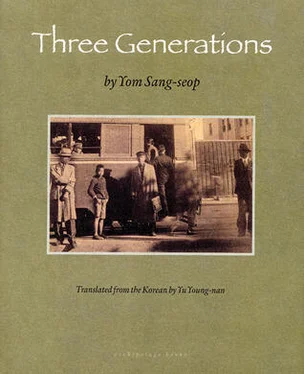“What would you like to study?”
“Anything.” In fact, she had no idea what field she’d choose if she were given such an opportunity. Her first priority would be to choose a field that could help her find a good job.
“Then, what’ll you do if you have to move far away in order to study?” Byeong-hwa asked after hesitating a little. His expression was resolute, having made up his mind. He studied Pil-sun closely.
“Where? Japan?” Pil-sun thought of Kyoto, where Deok-gi was.
“No, the place I have in mind is not so easy to get into.”
Pil-sun’s face fell when he mentioned Moscow, the capital of the Red country. “How could I go to such a place? I’m my parents’ only child. If I left them behind, how could they manage?” Pil-sun felt like crying as she imagined such a scenario. She needed the warmth of her parents’ love, regardless of whether she starved.
She remembered how the dog they had during their better days roamed about restlessly, refusing to eat after she had discovered that one of her litter was missing. The memory brought tears to Pil-sun’s eyes. At the mention of Russia, her mind drifted straight to Siberia. She pictured a young woman seen from far away, the size of a dot, trudging through a vast field under the evening sky, her progress negligible. When she recognized herself in that field, her tears spilled over.
“Don’t you like the idea? Is it that you can’t pry yourself away from your mother’s skirt? But what good is it if you’re stuck here? Wouldn’t it be better for you to study and see the world for a few years? I wouldn’t like being confined to this small country. And I’ll follow you soon, so you won’t be lonely, and there will be nothing to worry about. How about it?”
Byeong-hwa’s entreaties fell on deaf ears. This was completely opposed to what Deok-gi had asked his friend to do. She thought it was heartless of Byeong-hwa to encourage her when he was well aware of her family circumstances. But when he said he’d follow her abroad, her eyes opened wide.
Does he mean we’d go to Moscow, just the two of us, to make a private world of our own in addition to work? Does that mean he has special feelings for me? She hadn’t considered it, but she was not shocked. Byeong-hwa and Pil-sun got along so well that they were like brother and sister, teacher and student. Though Byeong-hwa said the contrary in his letter, does he have some other feelings for me? If so, what about his relationship with Hong Gyeong-ae? And why doesn’t he bring up Deok-gi’s offer to pay for my education, even in passing? Does Byeong-hwa mean for me to follow Pi-hyeok? Does he expect me to assist Pi-hyeok in his work? Didn’t Byeong-hwa just say there was a candidate for my husband and talk about playing matchmaker? Is he thinking that I’d have the chance to study and to marry him, too, if I followed Pi-hyeok?
Pil-sun’s imaginings had no end.
“If I had siblings, I’d be willing to go far away, but what would my father and mother do without me?” Pil-sun lamented.
“What if your parents gave you permission?”
“They never would, and I wouldn’t want to study if I had to go to such lengths. If you need a woman like me, why don’t you send Hong Gyeong-ae? I’m so ignorant that even if I went there, I wouldn’t be of any use — studying or working.”
Carrying the heavy burden of caring for her parents, Pil-sun couldn’t even conceive of a vagabond life. Nor did she dream of leading a luxurious life as the daughter-in-law of a rich family. She had no ambition except to make money to take care of her parents and to get married if the opportunity arose. She saw study only as a steppingstone to a better-paying job. However influenced she was by her father and Byeong-hwa, she had no desire to leave her family behind to carry out some mission or other, and she didn’t intend to sacrifice the possibility of marriage or happiness.
“You’re right. It would be good for Gyeong-ae to go. Either she would follow you first or I would. How about we all leave the country and live in peace and quiet?”
His explanation made Pil-sun’s mind spin again. He had no intention of going abroad with her alone. Rather, it sounded as if he had only work in mind.
Byeong-hwa, however, had no serious plans. One of the tasks Pi-hyeok had entrusted him with was the selection of three or four male and female students to send abroad. Though Byeong-hwa was aware of Pil-sun’s circumstances, he had sounded her out because she seemed so eager to study. He thought she’d jump at the chance. But, sadly, it seemed that she was no different from other ordinary women who were focused on their families. He had said Gyeong-ae would go but hadn’t yet raised the subject with her; with a child, it wouldn’t be an easy matter for her. He knew of no other candidates among his female acquaintances. Byeong-hwa wanted to complete his duties in Korea and leave himself, but he needed to find others to send first. All things being equal, he would have preferred to send a woman he knew well, like Pil-sun or Gyeong-ae.
Byeong-hwa laughed and said, “You want to study, but you want to do it in a place like Japan, where you can live comfortably, and have someone pay your tuition. I doubt you’ll find an opportunity perfect enough to suit your taste.”
Pil-sun thought he was mocking her. Offended, her face turned red, but she didn’t reply.
Byeong-hwa’s rebellious spirit drove him to deliver another jab: “To find such an opportunity, you might as well consider becoming the concubine of a rich old man. How else in today’s world. ”
Now Pil-sun was angry. How low of him if perhaps he hadn’t mentioned Deok-gi out of jealousy.
“Who says I’d sell my body for the sake of an education?” Pil-sun managed to say, as she fought down her tears.
“Calm down. I just meant that that’s what the world is like these days. Education is considered a prerequisite for a good marriage — merely an adornment that makes women more attractive. That is how far the value of education has degenerated. It’s not simply a means to land a good job. Lots of men are eager to marry female students, some even abandon their wives and children, don’t they?”
“Some may, but others may not.” Her contentiousness rose to meet his.
“Tell me who’s not like that. Who? Would you be willing to study if such a person encouraged you?”
Pil-sun didn’t respond. Her silence spoke for her.
“Deok-gi says he’d like to give you an education, but you should be wary of accepting favors from people. You are expected to give back as much as you get. How would you return such a favor? How many people in the world don’t expect anything in return?”
He made sense.
“If he were single, I wouldn’t oppose it, but he has a wife and a child. And he’s young.”
Pil-sun bowed her head.
Byeong-hwa stopped talking and let Pil-sun take her leave. He lounged on the floor for a while before shifting to his desk, intending to write a reply to Deok-gi’s letter.
He opened the drawer and spotted the letter from Deok-gi that he had torn in half. Before he had gone to see Pi-hyeok, he had ripped up all his letters in case something happened to him. This one, however, he had wanted to respond to before getting rid of it.
Had Pil-sun read it? Reprimanding himself for having put it in such a noticeable place, he scanned the letter as he reassembled the torn halves. The pages of one half were in the correct order, but the sequence in the other half was wrong.
“She read it,” Byeong-hwa muttered to himself.
Tedious days are dragging like thread spun from a silkworm. To talk about tedious days at my age — it’s as if my life were not worth living and deserved to be thrown into the wastebasket, but will I ever be able to lead a disciplined life on a daily basis? I suppose prisoners live with a sense of tension while they await their release, so their lives must be much more worthwhile than mine, which goes on only because I can’t bring myself to end it. To me, time and life seem inessential. What is there to do? Among Korean youth today, am I the only one who doesn’t know what to do with his time and life? Not that it would comfort me to know that I’m not the only one.
Читать дальше












